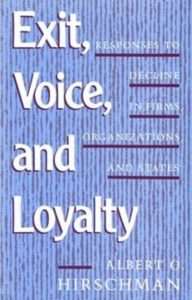Cato Unbound Symposium on the 50th Anniversary of Albert Hirschman's Classic Book "Exit, Voice, and Loyalty" [Updated]
The symposium includes contributions by Adam Thierer, Mikayla Novak, Max Borders, and myself. The relationship between exit and voice is as important an issue as ever.

The Cato Unbound website is holding a symposium on the 50th anniversary of economist Albert O. Hirschman's classic work, Exit, Voice, and Loyalty: Responses to Decline in Firms, Organizations, and States. Contributors include Adam Thierer of the Mercatus Center (who wrote lead essay), sociologist Mikayla Novak, innovation theorist Max Borders, and myself.
Thierer's lead essay emphasizes the ways in which technological innovation - particularly in the digital realm - has created important and valuable forms of exit rights that increase opportunity and constrain the authority of states. Novak uses Hirschman's theory to analyze the Black Lives Matter movement as an exercise of voice. My own contribution accepts the validity of many of Thierer's insights, but also emphasizes the importance of expanding exit rights in "real" as well as digital space. One part of the essay describes how the coronavirus crisis has revealed new opportunities for expanding remote work, but also highlighted the ways in which most people still need to live near their workplace and appear there in person in order to achieve anything close to full productivity. In addition, I discuss how the criticize Hirschman's famous argument that exit rights should sometimes be limited in order to avoid diminishing "voice."
Here is an excerpt:
Adam Thierer's lead essay is an excellent discussion of how the digital age has created important and valuable new exit rights. Online firms such as Amazon, Uber, and Airbnb have expanded consumer options in ways few imagined before the rise of the internet. In this respect, the digital age has strengthened the power of exit beyond what Albert Hirschman might have expected when Exit, Voice, and Loyalty was first published fifty years ago.
But appreciation for the benefits of digital exit should not be allowed to obscure the importance of exit rights in physical space, which is where all of us still live. No technological innovation provides an adequate substitute for the power to "vote with your feet" by choosing where to live and work. That is particularly true for the world's poorest and most disadvantaged people, many of whom are trapped under the rule of oppressive and corrupt regimes. While digital exit rights have improved in recent years, foot voting options have all too often been diminished….
For the vast majority of people, where you are allowed to live still determines how much freedom you have, whether you are subject to a variety of forms of oppression, and what employment and educational opportunities are open to you….
Despite his reservations about some aspects of exit rights, Hirschman pointed out that "[t]he United States owes its very existence and growth to millions of decisions favoring exit over voice" (106)…. Today, unfortunately, this heritage has been compromised by the most severe immigration restrictions in American history—adopted on the pretext of combating the coronavirus pandemic, by an administration that in fact seeks to extend them indefinitely. It is also endangered by restrictive zoning and other barriers to internal mobility. If not reversed, these trends will also endanger the innovation lauded by Thierer, since both international and internal migrants are major contributors to technological and commercial innovation.
As we cope with the coronavirus crisis and associated economic damage, America needs innovation and growth as much as ever. And millions of people around the world desperately need greater freedom and opportunity. We can achieve both by empowering more people to use exit rights to vote with their feet.
I explore many of the issues raised in my symposium piece in much greater detail in my recent book, Free to Move: Foot Voting, Migration, and Political Freedom. In that work, I also explore the ways in which my work builds on Hirschman's, but also differs with his analysis in a number of ways.
Max Borders' response essay is now available here.
The participants may also post further responses and rejoinders to each others' contributions.
The fact that Exit, Voice, and Loyalty remains relevant and widely read fifty years after publication is a testament to its significance, and to the power of Hirschman's insights. All of us who write on exit and voice have to take account of Hirschman's work, even - perhaps especially - when we differ with his conclusions.
UPDATE (August 21): Max Borders' response essay is now up.
